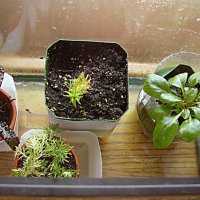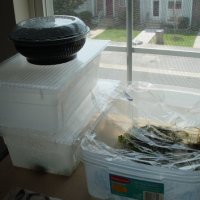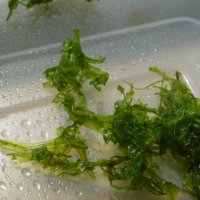Emersed Aquatic Plant Culture
 Most of the aquatic plants found in the aquarium hobby are not true aquatics.
Rather, they are marginal plants that spend some of year completely submersed,
and the rest of the year with at least some growth above the waterline. Most
plants will only flower above the water level and for this reason emersed growth
is a prerequisite for sexual reproduction. Flowering plants are typically classified
and studied through flower biology, so getting our aquatic plants to flower is a
necessary step in proper identification. Seemingly unrelated vegetative growth such as
Ludwigia sp. "Cuba" and Ludwigia repens have similar
flower morphology and therefore belong in the same genus.
Most of the aquatic plants found in the aquarium hobby are not true aquatics.
Rather, they are marginal plants that spend some of year completely submersed,
and the rest of the year with at least some growth above the waterline. Most
plants will only flower above the water level and for this reason emersed growth
is a prerequisite for sexual reproduction. Flowering plants are typically classified
and studied through flower biology, so getting our aquatic plants to flower is a
necessary step in proper identification. Seemingly unrelated vegetative growth such as
Ludwigia sp. "Cuba" and Ludwigia repens have similar
flower morphology and therefore belong in the same genus.
Commercially purchased aquarium plants are typically grown emersed - this is why old
leaves sometimes die off when the plant is initially submerged for long periods of time.
Plants are grown like this for several reasons, perhaps the most important being that
algae is not an issue when plants are grown above the water line. Also, the increased
diffusion rates of CO2 in air keep carbon availability from limiting growth rates. Plants
such as Anubius spp. and Cyrptocoryne spp. grow much faster above the
waterline.
 My emersed setup is a combination of approaches taken from discussions I have had with Luis
Navarro and Ricky Cain. Generally, just about anything will do, as both Ricky and Luis seem
to have success with approaches that emphasize neglect. The main points are to maintain very
high humidity, fertilize very weakly, keep temperatures cool and provide ample light. I use
a 2.5 gallon aquarium and plastic shoeboxes as growing containers. I maintain high humidity
by covering each container with either a sheet of Lexan or plastic wrap. It is important that
the lid not be too airtight tough, as plants do require fresh carbon dioxide and oxygen from
the surrounding air. I open my containers at least once a day and allow fresh air in.
My emersed setup is a combination of approaches taken from discussions I have had with Luis
Navarro and Ricky Cain. Generally, just about anything will do, as both Ricky and Luis seem
to have success with approaches that emphasize neglect. The main points are to maintain very
high humidity, fertilize very weakly, keep temperatures cool and provide ample light. I use
a 2.5 gallon aquarium and plastic shoeboxes as growing containers. I maintain high humidity
by covering each container with either a sheet of Lexan or plastic wrap. It is important that
the lid not be too airtight tough, as plants do require fresh carbon dioxide and oxygen from
the surrounding air. I open my containers at least once a day and allow fresh air in.
 Fertilization is accomplished by misting a 1/16 strength solution of houseplant fertilizer
into the container and onto emersed leaves. Containers sit in a south facing window and stay
in an air conditioned room. So far I have planted stem and rosette plants in standard potting
soil (in the future I want to investigated more sterile mediums, such as pearlite). To keep
the soil completely saturated, I place a ceramic flower pot filled with potting soil in the
bottom half of a milk container. The water level is kept at about half the height of the flower
pot, this keeps algae from forming on the soil surface and makes cleaning the aquarium easier
as each plant can be taken out individually.
Fertilization is accomplished by misting a 1/16 strength solution of houseplant fertilizer
into the container and onto emersed leaves. Containers sit in a south facing window and stay
in an air conditioned room. So far I have planted stem and rosette plants in standard potting
soil (in the future I want to investigated more sterile mediums, such as pearlite). To keep
the soil completely saturated, I place a ceramic flower pot filled with potting soil in the
bottom half of a milk container. The water level is kept at about half the height of the flower
pot, this keeps algae from forming on the soil surface and makes cleaning the aquarium easier
as each plant can be taken out individually.
| 






